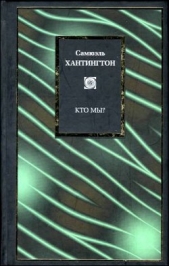Кто мы?

Кто мы? читать книгу онлайн
Новая книга Самюэля Хантингтона посвящена анализу ключевой для современного общественного сознания проблемы - определения идентичности. Приоритет общенационального самосознания особенно важен для страны, которую принято называть «плавильным тиглем народов», - Соединенных Штатов Америки. Однако сегодня в США набирают силу дезинтеграционные процессы, ставящие под сомнение сам факт дальнейшего существования феномена американской идентичности. Америка, как убедительно доказывает профессор Хантингтон, находится на переломе - и от того, в какую сторону в конце концов качнется маятник, зависит будущее не только Соединенных Штатов, но и всей мировой системы в целом.
Внимание! Книга может содержать контент только для совершеннолетних. Для несовершеннолетних чтение данного контента СТРОГО ЗАПРЕЩЕНО! Если в книге присутствует наличие пропаганды ЛГБТ и другого, запрещенного контента - просьба написать на почту [email protected] для удаления материала
70 Samuel P. Huntington, Political Order in Changing Societies (New Haven: Yale University Press, 1968), p. 93ff.
71 Anthony D. Smith, National Identity (Reno: University of Nevada Press, 1991), p. 150; Michael Novak, Further Reflections on Ethnicity (Middletown, PA: Jednota Press, 1977), p. 26; Will Kymlicka, Multicultural Citizenship: A Liberal Theory of Minority Rights (New York: Oxford University Press, 1995), p. 14; who levels the same charge against Canada and Australia; Robert N. Bellah, The Broken Covenant: American Civil Religion in Time of Trial (Chicago: University of Chicago Press, 1992), p. 93, quoted from Harold Cruse, The Crisis of the Negro Intellectual (New York: Morrow, 1967), p. 256.
72 Benjamin С Schwarz, "The Diversity Myth", Atlantic Monthly, 275 (May 1995), p. 57-67.
73 Adrian Hastings, The Construction of Nationhood: Ethnicity, Religion and Nationalism (New York: Cambridge University Press, 1997), p. 187, and Chapter 8 generally; Samuel P. Huntington, American Politics: The Promise of Disharmony (Cambridge: Harvard University Press, 1981), p. 154; Philip Schaff, America: A Sketch of Its Political, Social, and Religious Character (Cambridge: Harvard University Press, 1961), p. 72.
74 Louis Hartz, The Liberal Tradition in America (New York: Harcourt, Brace, 1955); William Lee Miller, "Religion and Political Attitudes", in James Ward Smith and A. Leland Jamison, eds., Religious Perspectives in American Culture (Princeton: Princeton University Press, 1961), p. 85; Huntington, American Politics: The Promise of Disharmony, p. 154.
75 Jon Butler, Awash in a Sea of Faith: Christianizing the American People (Cambridge: Harvard University Press, 1990), p. 38-66.
584
76 Sacvan Bercovitch, The Puritan Origins of the American Self (New Haven: Yale University Press, 1975), p. 144ff; Hastings, The Construction of Nationhood, p. 74-5; Morone, "The Struggle for American Culture", p. 426.
77 Edmund Burke, Reflections on the Revolution in France (Chicago: Regnery, 1955), p. 125-126 and "Speech on Moving Resolutions for Conciliation with the Colonies", in Ross J. S. Hoffman and Paul Levack, eds., Burke's Politics (New York: Knopf, 1949), p. 69-71.
78 Morone, "The Struggle for American Culture", p. 429; Alexis de Tocqueville, Democracy in America (New York: Vintage, 1945), vol. 2, p. 32; Huntington, American Politics p. 153; James Bryce, The American Commonwealth (London: Macmillan, 1891), 2, p. 599.
79 David Hackett Fischer, Albion's Seed: Four British Folkways in America (New York: Oxford University Press, 1989), p. 787; Kevin P. Phillips, The Cousins' Wars: Religion, Politics, and the Triumph of Anglo-America (New York: Basic Books, 1999), p. xv and passim.
80 John C. Green et al, Religion and the Culture Wars: Dispatches from the Front (Lanham, MD: Rowman Littlefield, 1996), p. 243-44.
81 George M. Marsden, Fundamentalism and American Culture: The Shaping of Twentieth Century Evangelicalism, 1870-1925 (New York: Oxford University Press, 1982), p. 6; Garry Wills, Under God: Religion and American Politics (New York: Simon and Schuster, 1990), p. 19.
82 Nathan O. Hatch, The Democratization of American Christianity (New Haven: Yale University Press, 1989), p. 4; William McLoughlin, ed. The American Evangelicals, 1800-1900; An Anthology (New York: Harper Row 1968), p. 26, quoted in Bellah, Broken Covenant, p. 46.
83 George Gallup, Jr., and Jim Castelli, The People's Religion: American Faith in the 90"s (New York: Macmillan, 1989), p. 93. For other estimates, see Cullen Murphy, "Protestantism and the Evangelicals", The Wilson Quarterly, (Autumn 1981), p. 107ff; Marsden, Fundamentalism and American Culture: The Shaping of Twentieth Century Evangelicalism, 1870-1925, p. 228; Boston Sunday Globe, 20 February 2000, p. Al.
585
84 Alexis de Tocqueville, Democracy in America (New York: Vintage, 1954), vol. I, p. 409; Bryce, American Commonwealth, Vol. 2, p. 417-418; Gunnar Myrdal, An American Dilemma (New York: Harper, 1944); Vol. 1, p. 495, Daniel Bell, "The End of American Exceptionalism", in Nathan Glazer and Irving Kristol, eds., The American Commonwealth 1976 (New York: Basic Books, 1976), p. 209; Seymour Martin Lipset, American Exceptionalism: A Double-edged Sword (New York: Norton, 1996), p. 63-4.
85 Seymour Martin Lipset, The First New Nation: The United States in Historical and Comparative Perspective (New York: Norton, 1973), p. 103.
86 William Lee Miller; John Higham, "Hanging Together: Divergent Unities in American History", Journal of American History, 61 (June 1974), p. 15; Jeff Spinner, The Boundaries of Citizenship (Baltimore: Johns Hopkins University Press, 1994), p. 79-80.
87 Lipset, American Exceptionalism, p. 63-4.
88 Francis J. Grund, The Americans in Their Moral, Social and Political Relations (New York: Johnson Reprint, 1968), p. 355-56.
89 Geert Hofstede, Culture's Consequences: International Differences in Work-Related Values (Beverly Hills: Sage, 1980), p. 222; Henry van Loon, "How Cadets Stack Up", Armed Forces Journal International (March 1997), p. 18-20; Lipset, American Exceptionalism, p. 218; Charles Hampden-Turner and Alfons Trompenaars, The Seven Cultures of Capitalism (New York: Doubleday, 1993), p. 48, 57. See also Harry С Triandis, "Cross-Cultural Studies of Individualism and Collectivism", Nebraska Symposium on Motivation 1989 (Lincoln: University of Nebraska Press, 1990), vol. 37, p. 41-133.
90 Bellah, Broken Covenant, p. 76; John G. Cawelti, Apostles of the Self-Made Man (Chicago: University of Chicago Press, 1965), p. 39ff; Bill Clinton, remarks to Democratic Leadership Council, 1993 quoted in Jennifer L. Hochschild, Facing Up to the American Dream, p. 18.
91 Judith N. Shklar, American Citizenship: The Quest for Inclusion (Cambridge: Harvard University Press, 1991), p. 1-3, 67, 72-5.
586
92 Schaff, America: A Sketch of Its Political, Social, and Religious Character p. 29; Michael Chevalier, Society, Manners and Politics in the United States; Letters on North America (Gloucester, MA: Peter Smith, 1967), p. 267-68.
93 Roger M. Smith, "The 'American Creed' and American Identity: The Limits of Liberal Citizenship in the United States", Western Political Quarterly, 41 (June 1988),p.239, citing Eric Foner, Free soil, Free Labor, Free Men: The Ideology of the Republican Party before the Civil War (New York: Oxford University Press, 1970); Cawelti, Apostles of the Self-Made Man, esp. p. 39ff.
94 Cindy S. Aron, Working at Play: A History of Vacations in the United States (New York: Oxford University Press, 1999), p. 236; International Labor Organization Study September 1999, cited in The Daily Yomiuri, 7 September 1999, p. 12; Prospect, No. 49 (February 2000), p. 7, citing Boston Review, December 1999-January 2000.
95 Daniel Yankelovich, "What's Wrong— And What's Right — With U.S. Workforce Performance", The Public Perspective, 3 (May/June 1992), p. 12-14; "American Enterprise Public Opinion and Demographic Report"; Jack Citrin, et al, "Is American Nationalism Changing? Implications for Foreign Policy", International Studies Quarterly, 38 (March 1994), p. 13.
96 New York Times, 9 May 1999, p. WK5; Shklar, American Citizenship, p. 98.
97 Schaff, America: A Sketch of Its Political, Social, and Religious Character, p. 29; Hochschild, Facing Up to the American Dream pp. 228-29; New York Times, 11 February 1999, p. Al.























